The Fishipedia Q&A: Jeremy Wade

How far would you go to land your dream fish? What sacrifices would you make? Before you answer, for a measure of perspective, consider the exploits of Jeremy Wade. The presenter of the hit TV show River Monsters has dedicated his life to the pursuit of the world’s most fearsome underwater inhabitants in some of its most inhospitable regions. He’s been accused of spying, contracted near-fatal malaria, crash-landed in the Amazon jungle and narrowly escaped death at the hands of bloodthirsty villagers in the Congo — all thanks to an all-consuming passion for what lurks beneath the surface of the world’s waters…
 Wade’s reward for this lifetime of derring-do is a scrapbook of adventures that most of us can barely comprehend, let alone aspire to, and three series of a hugely successful TV show to go with it. Selected highlights so far include: the capture of two of the biggest bull sharks ever recorded; diving with man-eating Indian catfish; going toe-to-toe with 200lb Amazonian arapaima and tangling with goliath tigerfish (after a 25-year pursuit). The list is long and the cast is ugly — the attributes of some of these creatures would stretch credulity were it not for the fact that they’re actually swimming in the waters around us. Chances are, most of us wouldn’t have even heard of them were it not for Wade’s pioneering exploration.
Wade’s reward for this lifetime of derring-do is a scrapbook of adventures that most of us can barely comprehend, let alone aspire to, and three series of a hugely successful TV show to go with it. Selected highlights so far include: the capture of two of the biggest bull sharks ever recorded; diving with man-eating Indian catfish; going toe-to-toe with 200lb Amazonian arapaima and tangling with goliath tigerfish (after a 25-year pursuit). The list is long and the cast is ugly — the attributes of some of these creatures would stretch credulity were it not for the fact that they’re actually swimming in the waters around us. Chances are, most of us wouldn’t have even heard of them were it not for Wade’s pioneering exploration.
So, on hearing that the man himself was spending a brief stint back ‘in civilisation’, we caught up with him to discuss unidentified Amazonian lake monsters, cheating death (on more than one occasion), the huge success of River Monsters and what we can expect in the new series…
.
With three series of River Monsters in the bag and another one in the pipeline, the show’s been a huge success. Fishing aside, what are the main challenges you face putting the show together?
We film in some very remote locations and one of the things I have to do, before we can start fishing, is navigate the human environment. When I get to these places, a lot of the information we use is from local people, so it’s all about engaging with them. Very often, if you steam in with direct questions, you won’t get very far – you have to spend time with them, prove yourself, show them you know a little bit about catching fish and get around their suspicions. The thing is, if you turn up somewhere and you tell them you want to catch fish, have a look at them and put them back, it just sounds so unlikely that it has to be a cover story for something else. In the Amazon, to this day, there are people who think I’m there looking for gold, and I’ve been accused of spying on another occasion in Thailand.
And you found yourselves in serious danger with the locals in the Congo…
The thing with that part of Africa, is that the general outlook of people is very different from ours. The mindset is that if something happens, particularly something bad, it’s not just a random thing or an accident – it must have a cause. In the Congo, a local went missing and it just happened to coincide with us turning up in the village, so therefore it must have been our fault. We only found out after the event that they were seriously talking about removing us from the equation.
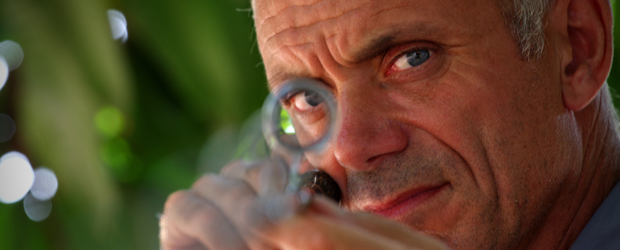 There’s almost no fishery in the world that hasn’t been overfished to some extent. How has that hampered your quest for monster fish?
There’s almost no fishery in the world that hasn’t been overfished to some extent. How has that hampered your quest for monster fish?
The picture all round the world is of the numbers falling, and when the numbers are less, then you don’t tend to get those extreme, freak individuals. There’s one exception though – the River Ebro in Spain where wels catfish were introduced 35 years ago or so. They’re really growing in the warm water there and it’s mainly catch and release, so in this instance we have a fairly reliable idea of what their potential is.
There’s a fundamental difference between animals that live in the water and animals that live on land. An animal on land, if it grows too big, gets to a point where it can’t really move around too well, and it will therefore struggle to feed. But if you have fish in a situation where they don’t have to expend too much energy and they can get plenty of food, they just keep on growing. So, if somebody says to me that they’ve seen something considerably bigger than what would be considered normal, I don’t disbelieve them. If it was a land animal you’d think they were making it up, but because it’s a fish it might be possible.
You famously photographed an unidentified monster in Lago Grande in the Amazon. As a scientist, does the fact that you haven’t been able to positively ID that creature haunt you?
Well, the only way to be sure with that would be to net it, but that’s not going to happen. It might have died by now anyway – it was well over 10 years ago that I last saw it. Sometimes you stand there by the water wishing you had a magic pair of glasses that would allow you to look into the water and see all the fish there. But that would destroy the attraction, wouldn’t it? I like the fact that there is still mystery in the world.
What did the locals make of your sighting?
Well, that was the other significant thing about that creature – I was in a position where I’d seen something, very fleetingly, but when I started telling the locals about it, they all told me I was making it up! It’s at that point that you start to doubt your own eyes. It was only because I got a picture of it the next year that I was able to reassure myself that, no, I wasn’t making it up. So now, if somebody else tells me something similar, I’m less prone to dismiss it.
In the intervening years, have you ever met anyone who’s seen the same thing?
I have met a couple of locals who have seen it and know what I’m talking about. Interestingly, when I had the photographs to show people, a few of them would say: “No, I’ve never seen that… we have seen some other stuff though, do you want to hear about that?” They’d then launch into stories about giant snakes – things that might be about 50 yards long with eyes like searchlights, that send out a wake which overturns boats. And they’re telling you this in a perfectly matter-of-fact way. I know there are very large anacondas in the amazon, but some of these people were talking about stuff that’s another order of magnitude altogether. I find it very hard to wrap my head around that. At some point you start shading off into mythology – it’s all about establishing the point at which that happens.
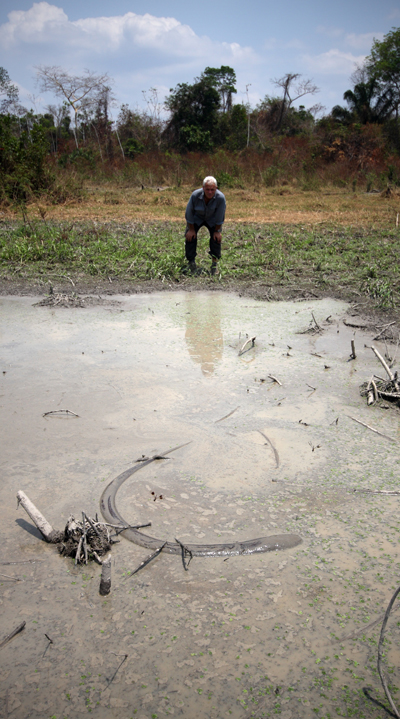 What next for River Monsters (if you’re able to tell us without giving too much away)? Are there any frontiers left?
What next for River Monsters (if you’re able to tell us without giving too much away)? Are there any frontiers left?
I do keep thinking that I’m running out of material, but what’s interesting is that the more you dig, the more you find. I think what’s happening at the moment is that we’re getting into the slightly more quirky stories. In series one and two we had fairly obvious subject matter – big fish with big teeth that are potentially dangerous to humans. That potential danger is our hook, that’s our way of getting the audience in – where we’re going now tends to be looking at fish with more imaginative ways of being dangerous. A good example of that was the electric eel which we covered in series three.
In another show we looked at a story in Japan, in which parents tell their children there’s something in the water – something that’s a bit fish-like but with hands, that pulls children into the water. The obvious question is: is that totally made up? If you’re a parent trying to explain to your children that the water is dangerous, it’s a good way of getting their attention. I wanted to establish whether it was complete fiction or based on something real out there – it turns out there is something real in the water that does mesh with all that folklore.
Have you been surprised just how successful the show has become?
I have. It’s incredible really – we’re getting biggest audiences in the history on Animal Planet, and it’s going around the world now.
We did set out to make it appeal to a general audience – I think it’s done that to an extent we didn’t really foresee. One thing that’s really nice is that loads of kids watch it, even though it’s a bit scary. Part of that, I think, is because the shows are a bit like fairy tales. It’s all about how you deal with fear: there’s some unknown creature out there, it sounds really horrible and ugly, and everyone’s afraid of it – so what do you do? The two obvious ways are to either hide away and never leave the house, or try to destroy the thing you’re afraid of. What we try to show is that there’s another way – you set out to understand whatever it is. And once you’ve seen it and you understand its motivation, you’re then in a situation where you can co-exist with it.
We’ve tapped into the fact that everybody is fascinated by predators. If those predators are right in front of you and you can’t see them, that makes it even more creepy. We are descended from people who paid attention to stuff in the environment that was potentially harmful. The people who didn’t pay attention didn’t leave descendants.
And there’s an important thread running through the shows regarding conservation…
Well, there are a few people out there for whom fishing always provokes a knee-jerk reaction, and they ask why we feel we have to kill innocent creatures. Quite often they’ve missed the fact that we don’t actually kill them, and that sometime the work we do is helping their preservation. That’s very important. People can only care about something if they know it exists in the first place – a lot of these animals, nobody knew they existed.
 Having caught all these weird and wonderful species in every part of the world, when you return home [Jeremy lives near Bath, in the west of England] do you find it difficult to enjoy the more sedate style of fishing?
Having caught all these weird and wonderful species in every part of the world, when you return home [Jeremy lives near Bath, in the west of England] do you find it difficult to enjoy the more sedate style of fishing?
I haven’t fished back at home for quite a long time – mostly because I don’t have the time and the resources. I would like to, though. I grew up fishing on the River Stour in Suffolk and there’s part of me that would quite like to go back, but the trouble is it might shatter all your memories. I do spend quite a bit of time just walking by water without fishing.
Do you need a break from it when you return from filming?
There’s always this risk that if you’re interest becomes your job, then that can spoilt it for you. That hasn’t happened, but I’m away so much that when I come home I’m just in recovery mode.
In your book, you talk a bit about being something of a lost soul after your university days. Has fishing and the success of River Monsters helped you find your place in the world?
I think it has. Back in my early 20s I drifted into teaching. I never really wanted to be a teacher but I drifted into it and got out of it very quickly, having found it really disillusioning. But I did get a glimpse of potentially how satisfying it can be. What’s interesting is that, as a thwarted teacher back then, I felt I was having so many obstacles put in front of me when I was just trying to teach maybe 150 children. But the fact that there are now millions of people tuning into our shows, learning, a huge number of which are children, is a wonderful privilege.
A few years ago, people were saying that fishing had led me to completely waste my life, but in some senses it can salvage your life too.
Near-fatal malaria, plane crashes, accusations of spying, bloodthirsty locals – you’ve found your life in danger on plenty of occasions. Does it seem ironic that not once has it been thanks to the supposed man-eaters you’re pursuing?
Not really – it makes sense. When we’re making a TV show like this, what we’re trying to do is show this creature which lives in the water, so we have to get it out. It has to be hands-on, and if you lose your concentration for a fraction of a second it could end badly. That means I’m always very focused – I’ve done my research, I know what I have to look out for.
But the real danger is the other things in the environment that come out of the blue, despite all the research you’ve done.
 Finally, if you had one day left to go fishing, where would you go?
Finally, if you had one day left to go fishing, where would you go?
That’s a very tricky one. I might go for the Rio Teles Pires in Brazil. It’s part of the Amazon that’s protected, there’s an amazing variety of fish there, and there’s a very dramatic landscape. It’s forested, but with rocky rivers and lots of rapids. There are rumours that it’s shortly to be dammed, in which case it will disappear.

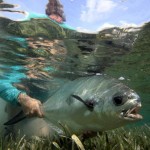
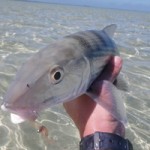
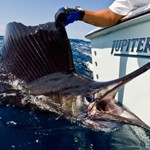
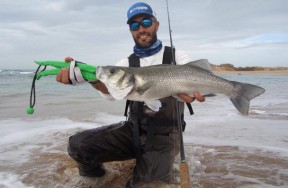
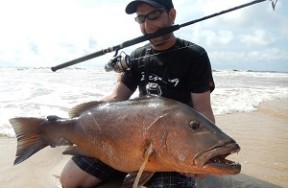
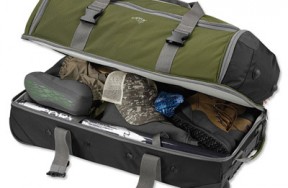
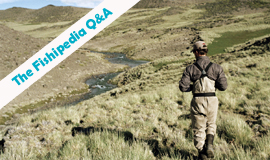
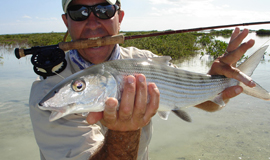
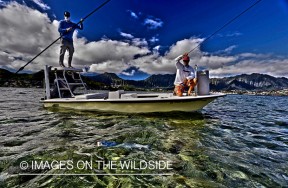
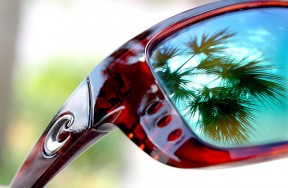
Great interview-his final comment about the Rio Teles Pires, Brazil is something that I totally understand as I have fished their myself twice. There is a dam being constructed upstream, but most of the area is still fishable. I don’t know what the future will bring the area, but I hope I have another opportunity to fish there-maybe with Jeremy!
Yep, it’s yet another one to add to the bucket list Terry! So little time, so many places, and so many fish…